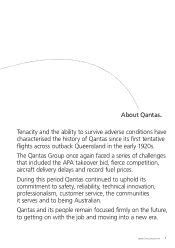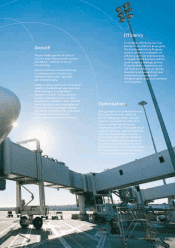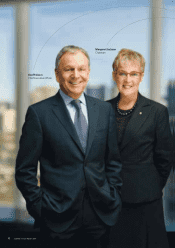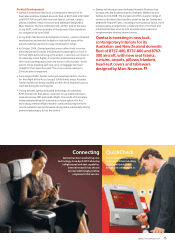Qantas 2007 Annual Report Download - page 11
Download and view the complete annual report
Please find page 11 of the 2007 Qantas annual report below. You can navigate through the pages in the report by either clicking on the pages listed below, or by using the keyword search tool below to find specific information within the annual report.9Qantas |Annual Report 2007
Safety and Security
Our commitment to safety and security – of our customers, our
employees and our assets – remains paramount.
Qantas this year completed the International Air Transport
Association’s Operational Safety Audit (IOSA) and achieved IOSA
Registration. The internationally recognised IOSA program is a global
benchmark for airline safety and quality and the most stringent safety
and security audit program in the industry.
The Group’s employee occupational health and safety program
be safe!, has dramatically increased safety awareness and operational
safety reporting rates indicate a continuously improving safety culture.
be safe! has led to an 80 per cent reduction in employee injury since
it commenced in 2001.
We look forward to the Federal Government’s introduction of
mandatory random alcohol and drug testing for all safety sensitive
roles in the aviation industry.
Qantas’ commitment to passenger security has been underscored by
the Group’s investment of more than $1 billion in enhanced security
measures since 2001. New screening equipment includes x-ray and
explosive trace detection technology for carry on, checked baggage
and air freight.
Qantas complies with all security requirements of the many countries
in which the Group operates.
We worked closely with the Federal Government to facilitate the
introduction of enhanced cabin baggage security measures for
international flights in March 2007, which limits the quantities of
liquids, aerosols and gels taken through security screening points
by people flying to and from Australia.
Our People
This year, we pay particular tribute to our Qantas people, who have
risen admirably to the challenges of innovation, efficiency and rapid
growth. Qantas staff showed exceptional professionalism during the
bid for Qantas by APA and we thank them for never faltering in their
dedication or performance throughout this period of uncertainty.
In recognition of the contribution Qantas made in achieving our strong
financial result in 2006/07, eligible Qantas employees were awarded a
bonus totalling $2,000, comprising a $1,000 cash payment and $1,000
worth of Qantas shares.
Qantas will always be one of Australia’s largest employers. With
around 37,000 people, we have 18 per cent more full-time equivalent
employees than seven years ago and more than 90 per cent of our
people are based in Australia.
Our human resources strategy is to improve productivity, develop
management and leadership, engage employees and build a safer
workplace. Together, these continue to build on our reputation as a
responsible employer. Key areas of focus include:
•instilling safety as a priority for all staff;
•promoting diversity in our workforce;
•leading and managing a multi-generational workforce;
•managing skills shortages through keeping and growing key talent;
and
•using flexible work practices to foster work-life balance and
operational effectiveness.
Qantas continued its focus on vocational training, with more than
$280 million spent on staff training and related costs during the year.
A second Joey Club child care facility was established for Qantas staff
at Melbourne Airport in January 2007. The first Joey Club was opened
at Qantas’ Sydney headquarters in 2003.
Community and the Environment
During the past year, Qantas contributed millions of dollars to arts,
sporting and community groups and charities – including key Qantas
charities CanTeen, CARE Australia, Mission Australia, Starlight
Children’s Foundation Australia and UNICEF – through sponsorship,
donations and in-kind support.
Twenty two paintings sold from the Qantas art collection achieved a
total sale price of more than $3.4 million. The proceeds will be used to
establish a major art scholarship program, which will officially launch
in 2008.
The impact of climate change on the environment is a major concern.
The Group has invested millions of dollars in recent years to make its
day-to-day operations more efficient and reduce its emissions
footprint. This has been achieved through a range of initiatives that
this year delivered more than 280,000 tonnes saving of carbon dioxide
emissions. The Group is on course to achieve cumulative savings of
two million tonnes over the five years to June 2011 through a range of
initiatives including the entry into service of new fuel efficient aircraft.
By June 2011, annual emissions will have been reduced by 870,000
tonnes compared to 2004/05 aircraft consumption rates.
Qantas will continue to actively manage its operations and growth in
a sustainable manner, with the aim of reducing our environmental
impact where possible.
Board Changes
In May 2007, the Chairman of Qantas and Independent Non-Executive
Director Margaret Jackson, AC and Independent Non-Executive
Director James Packer announced their intention to retire from the
Board of Qantas later this year.
Leigh Clifford was appointed as a Non-Executive Director in August
2007 and will become the new Chairman of Qantas at the conclusion
of the Qantas Annual General Meeting in November 2007. Mr Clifford
had a 37 year career with Rio Tinto before stepping down as Chief
Executive Officer in April 2007.
Our Challenges
Aviation remains a highly competitive industry. The positive global
environment is likely to continue, encouraging current players and new
entrants to expand market capacity.
Fuel costs remain a challenge. In 2005/06, fuel prices totalled
$2.8 billion – a 45.1 per cent increase on the previous year. This year,
they increased by a further 19 per cent, or more than $500 million,
despite hedging programs.
Domestically, Virgin Blue is targeting the business travel market and
will grow capacity on trunk and regional routes when it starts taking
delivery of a new fleet of regional jets. The Singapore-based low cost
carrier Tiger Airways has also arrived as a new domestic competitor for
both Qantas and Jetstar.
On most international routes, Qantas competes with at least one
airline that benefits from government ownership, control or support.
Many also operate from favourable hub locations that enable them
to combine sets of air rights obtained from third countries to build
strong networks more readily than “end of line” carriers such
as Qantas.
The challenges facing Qantas in the international arena have been
underscored by the Australian Government’s recent decision to grant
significant additional air rights to three Middle Eastern hub carriers.
Virgin Blue plans to commence trans-Pacific services in 2008 and new
Malaysian long-haul low cost carrier AirAsia X is planning services
between Malaysia and Australia.
This current era for aviation presents an historic opportunity for Qantas
to make ourselves an integral part of the Asia Pacific growth story.
At the same time, we must remain poised to adapt to any unexpected
challenges that arise. To succeed, we must continue our relentless
focus on costs and maintain our flexibility, discipline and resilience.
























